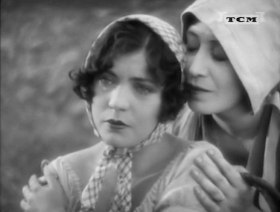It’s hard to watch The Big Parade without thinking of the war films that came after it, even including modern ones such as Saving Private Ryan and Band of Brothers. So well did King Vidor do his job, that he established the template for the genre; the very model of a modern major war film. He also made a work that remains gripping and gruesome to this day. My teenage daughter stepped away from her laptop concerned for the hero’s story resolution whilst her blue stocking grandmother (armed with a doctorate and an array of degrees, including film studies – she’s qualified to write this blog even if I’m not!), insisted on watching it again!
So, a real family film in the event and one that got us debating the Great War, war in general and the acting qualities of star John Gilbert without his trademark ‘tache!
But, overwhelmingly, a great film that fully deserves its place in the pantheon, that rare beast, a hugely successful film that is close to a master work.

Shot whilst the “war to end all wars” was still fresh in the memory, The Big Parade could be viewed as an anti-war film but it doesn’t pass judgement other than on the horror of war itself. John Gilbert plays James Apperson, listless son of a wealthy businessman who is stirred into signing up by the big parade for enlistment – caught up in the patriotism the intertitles suggest may be artful more than genuine.
He falls into the parade of trained soldiers and heads for France with his buddies from more earthy stock, the relentlessly baccy chewin’ Slim (Karl Dane) and the pugnacious Bull (Tom O'Brien). They enjoy an almost peaceful, pastoral start to the campaign staying in a picturesque French village where larks are had and James falls for a pretty French girl, Melisande (Renée Adorée). They communicate through a phrase book and he, touchingly, teaches her to chew gum.

But, just when you’re getting comfortable, Vidor ups the pace and the parade packs up and noisily heads for war leaving Melisande forcefully dragged away from her lover who vows to return. We see an impossibly long line of trucks heading for the front with war planes flying overhead: “it has begun!”.

Catching us all by surprise, the boys meet their first action in almost prosaic circumstances…they march through a wood in formation and only gradually do you start to notice that around them, men are falling to the ground, picked off by snipers. This is the casual horror of the First World War and its tactics that were poorly suited to the technological advances of its weaponry. Force of numbers had to compensate for lack of a good position and the film is shocking in the way it accurately depicts the conflict.

The boys finally get to the front line and take refuge in make-shift trenches and bomb craters as they wait for support to arrive. They’re bored and brave still cracking wise when death by gun, gas or bomb is an ever-present possibility.Vidor’s direction is superb as he paces things perfectly marshalling thousands of soldiers, tanks, planes and ordinance to recreate hell on earth.
Explosions and smoke fill the screen and we see men, impossibly, still alive within this carnage. Vidor must surely have been influenced by contemporary film of the Somme and other battles for this feels real - an horrific clash of fragile humanity against the devices of war. The miracle is that any can live through this and that those who might could survive intact.

Enraged by the death of a comrade, James leads a charge against the German placements, he kills and helps create a breach in the line. Wounded in the leg he takes on an injured German soldier. The two fall into a crater and James pulls back from killing the man as, bayonet at his throat, he looks into his eyes. Gilbert is great in this scene; blackened by the action in every sense, drained of compassion and yet still capable of recognising the humanity of his enemy. He offers him a cigarette and keeps on pushing the other’s face away. It’s a primal, almost ape-like shove and we believe him.

How this actor could have been so forgotten or reduced to a romantic prop is hard to fathom on this performance. He is ably supported by the excellent Renée Adorée who is full of relaxed emotion and genuine warmth; not Gilbert's usual love interest and all the better for it. The close of the film belongs to both and there were tears in the eyes of all three generations as we watched things unfold.
The Big Parade shows Vidor as one of the great directors. It influenced not just the films made shortly afterwards, All Quiet on the Western Front and La Grande Illusion being just two, but also many more down the years right up to Spielberg and the rest. I hadn’t expected it to be so convincing but it was and it was perfectly balanced between the humour in the first half and the horror in the second.

I watched the Thames Silents version with its excellent Carl Davies score; the film is very rhythmic and the same army songs that moved the actors helped dictate the pace of the orchestration.
Quite hard to find when it shouldn’t be! Time for a King Vidor box set!!












































